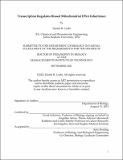Transcription Regulates Biased Mitochondrial DNA Inheritance
Author(s)
Corbi, Daniel R.
DownloadThesis PDF (9.428Mb)
Advisor
Amon, Angelika
Solomon, Frank
Terms of use
Metadata
Show full item recordAbstract
Maintaining mitochondrial DNA (mtDNA) is essential in eukaryotes for cellular respiration and ATP production by oxidative phosphorylation. Respiration is the preferred method for creating mitochondrial membrane potential, which is important for the import of nuclearly encoded proteins into the mitochondrion as well as supporting oxidative phosphorylation. Loss of mtDNA causes problems with maintaining membrane potential and mitochondrial ATP production, making mtDNA of critical importance to cells. However, mtDNA inheritance in proliferating cells is not fully understood. There is a set of mtDNA mutants in Saccharomyces cerevisiae, called hypersuppressives, that exhibit biased inheritance when competed with wild-type (rho+) mtDNA. A particular hypersuppressive allele, HS ORI5-1, damages rho+ mtDNA in the same cell and eliminates respiratory capability from progeny. Overexpression of a mitochondrial RNA exonuclease that interacts with the mitochondrial RNA polymerase inhibits mitochondrial transcription and restores inheritance of rho+ mtDNA when competed against HS ORI5-1. Reduction of mitochondrial transcription affects only particular hypersuppressive alleles, suggesting that there may be multiple ways to achieve biased inheritance.
Date issued
2021-09Department
Massachusetts Institute of Technology. Department of BiologyPublisher
Massachusetts Institute of Technology